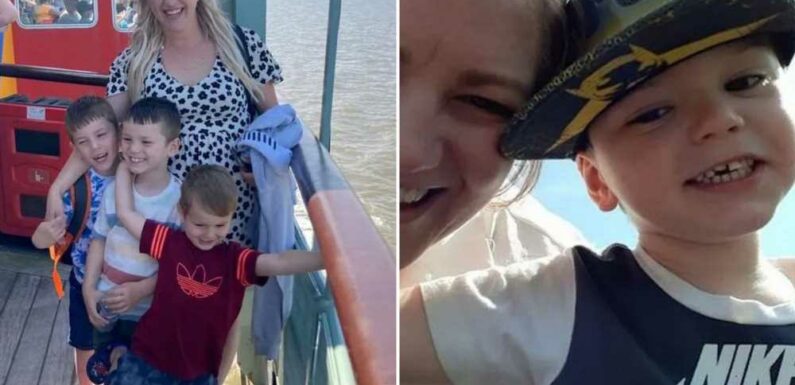
A LITTLE boy, whose mum thought bruising on his body was because of his clumsiness, was later diagnosed with a killer disease.
Jaxon Crawford, aged two, started showing bruises on his tummy which his mum, thought were due to him bumping himself after just been diagnosed with an eye condition.
It was only when mum Kelly realised the bruising hadn't disappeared and young Jaxon, from Blacon, Chester showed a temperature she started to worry and took him to hospital.
Tests revealed the young boy had acute lymphoid leukaemia – a blood cancer most common among children.
Jaxon, who has a twin brother named Eli and another brother Dylan , was admitted to Alder Hey Children’s Hospital in Liverpool, immediately.
Doctors quickly started him on 30 days of steroids and intensive chemotherapy.
Read more on cancer
Nurses to strike for first time in union’s history TODAY with cancer care hit
‘Game-changing’ first cancer vaccine ‘slashes risk of death or relapse by 44%’
But tests revealed the first few bouts of chemo failed to kill the cancer, so medics upped his dose of the treatment.
After several weeks of chemo, Jaxon lost his hair which is mum says he was really upset by.
But Kelly reassured him by saying he had "magic hair" which would grow back once he was out of hospital.
Kelly, who is now aged 30, was pregnant with Dylan while Jaxon was ill, but managed too take early maternity leave from her job at the Post Office so she could stay in hospital with Jaxon.
Most read in Health
Striking nurses break picket line to help man who collapsed
Full list of NHS hospitals where nurses are on strike today – are you affected?
Nurses to strike for first time in union's history TODAY with cancer care hit
Pink coffin for girl, 5, driven through street after she died from Strep A
Jaxon, now six, was placed on two years of maintenance treatment which involved taking oral chemotherapy every night at home in addition to ongoing chemotherapy, lumbar punctures, and steroids.
Now, four years on, Jaxon has responded "well" to treatment, but still requires checkups every three months, Cheshire Live reported.
Kelly said: "I am very proud of Jaxon for settling in so well at primary school and getting on with life.
"I recently panicked when he was covered in bruises and feared he had relapsed, but then he told me he had been playing football with the older boys," she added.
What are the symptoms of leukaemia?
There are no specific signs or symptoms which would allow for a doctor to make a diagnosis without lab tests.
In all types of leukaemia symptoms are more commonly caused by a lack of normal blood cells than by the presence of abnormal white cells.
As the bone marrow becomes full of leukaemia cells, it is unable to produce the large numbers of normal blood cells which the body needs.
This can lead to:
- Anaemia
- Weakness and tiredness
- More frequent infections
- Fever
- Bleeding and bruising
Kelly has found readjusting to normal life harder than she expected after the regular safety net of seeing doctors and nurses most weeks for three and a half years.
More than half of Jaxon’s life has been taken up by illness.
Jaxon, a pupil at Dee Point Primary School, has now received an award for his bravery. He has been presented with a Cancer Research UK for Children & Young People Star Award, in partnership with TK Maxx, having been nominated by his mum.
As well as a star-shaped trophy, Jaxon also received a £50 TK Maxx gift card, t-shirt, and a certificate signed by the celebrities. His twin brother Eli received a certificate too.
Cancer Research UK spokesperson for the North West, Jane Bullock, said: "Jaxon is a real star who has been through so much at such a young age. It has been an absolute privilege to be able to celebrate his courage with a Star Award.
"As we mark our 20th anniversary, we’re reflecting on the progress made in the fight against the disease, but there’s still much further to go."
She added: “Cancer in children and young people is different to cancer in adults, from the types of cancer to the impact of treatment – and many youngsters may experience serious long-term side effects.
"That’s why we’re supporting dedicated research to ensure more children and young people survive cancer with a good quality of life.”
Source: Read Full Article






